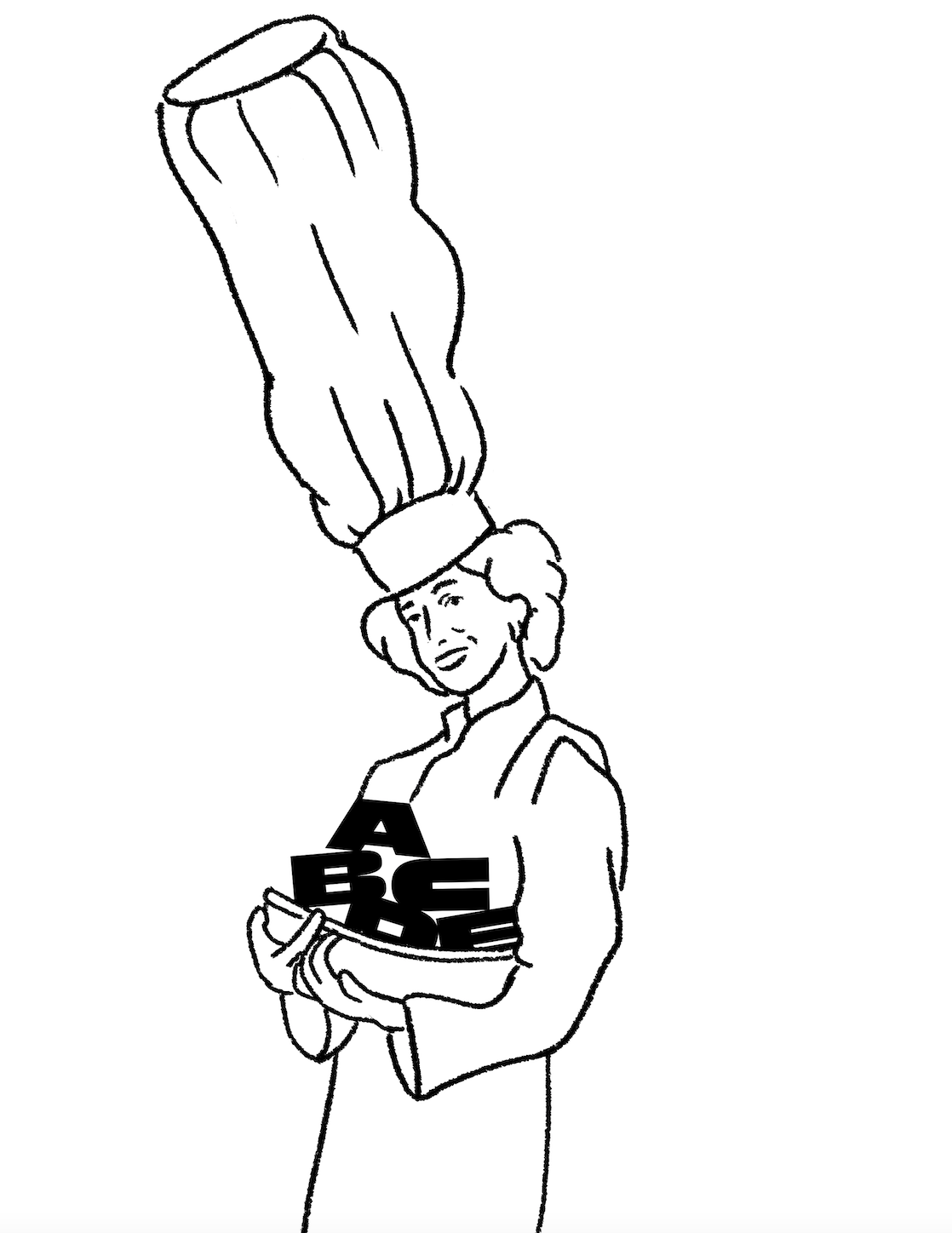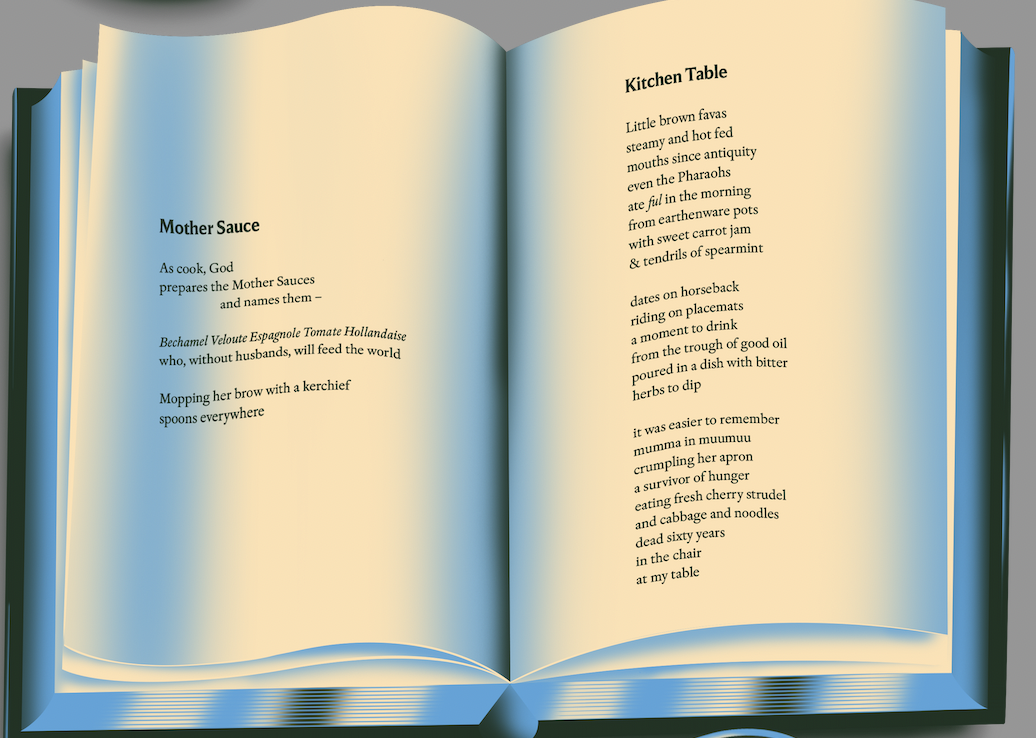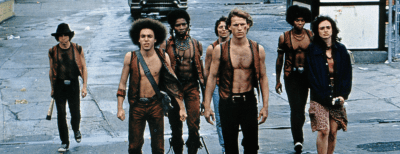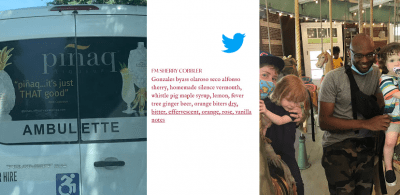Rozanne Gold with Hizzoner Ed Koch at the Rainbow Room, 1989 (Photo: Steve North)
The life and rhymes of Rozanne Gold
The pioneering chef and restaurateur is adding a new line to her impressive resume: Published poet
This article originally ran in the fall print issue of Brooklyn Magazine — click here to subscribe today.
Oh, my God. Rozanne Gold — the four-time James Beard Award-winning chef known as “one of the most important innovators in the modern food world” per Julia Child’s biographer, Bob Spitz — has come for lunch.
I’m not sure why or how it seemed like a good idea at the time to offer to cook a meal for the author of 13 cookbooks, but here we are.
Lauded as a food influencer before everyone was some kind of influencer, she seems to have done it all: At age 23 she was living at Gracie Mansion as the private chef for Mayor Ed Koch, and by the time she was 40, she had cooked for a president, prime minister and brigadier general; created the original menus for both the Rainbow Room and Windows on the World; helped usher in the small-plate craze; and written her first book, “Little Meals: A Great New Way to Eat and Cook.”
All this from a woman who never went to culinary school. Navigating the arc of her amazing career is daunting. But we’ll get to that later. First, we feast. I hope.

Illustration by Christophe Marchand
‘There is nourishment here’
Today she is here for a tasty conversation about “Mother Sauce,” her first book of poetry, to be released mid-October.
Published by Dancing Girl Press, this little book of poems is a feast for the heart and the soul. As poet Krista Leahy puts it, “The poems are a warm invitation to join the hearth where the Mother Sauce nourishes all the Daughter Sauces, answering the question, How to get fed?”
With poem titles like “How to peel a carrot,” “A woman carrying fruit on her head” and “Kitchen table” and “Food from my mouth,” “Mother Sauce” invites us to “step into this kitchen.”
“There is nourishment here,” says author Robert Balun.
Seasoned with everything from razzmatazz to gravitas, the nourishment is not without sexy — if not downright racy — humor.
To give you a taste, here is an excerpt
from, well, “Razzmatazz” (best paired
with Miles Davis Quintet’s “Workin’”).He said razzmatazz when I opened the door
and razzmatazz he was eager to score
He said razzmatazz when we climbed on the sheets
and razzmatazz when he got to the beat
He said razzmatazz when I opened the bottle
and razzmatazz when he went full throttle
I gave him razzmatazz and vanilla ice cream
he said razzmatazz and then told me a dream…..
It’s hardly news that food and sex go hand in hand (or mouth). But I ask Gold how food fits into poetry. “Food is poetry and chefs are poets,” she says.
Of course, she’s right: Dominique Crenn, the first female chef in the United States to be awarded three Michelin stars, has a “Grand Tasting Poem Menu” at Atelier, in San Francisco. Crenn describes her menu as “poetic culinaria.”
Sylvia Plath was known to bake a dozen cakes in a day when she was battling writer’s block. She had a lemon pudding cake in the oven as she wrote “Lady Lazarus.”
Maya Angelou wrote cookbooks, including “Great Food, All Day Long: Cooking Splendidly, Eat Smart,” and was quoted as saying, “Cooking is like writing poetry … the way one puts nouns and pronouns and verbs together is similar to a cook’s choice of ingredients.”
Words as ingredients
Gold has actually been writing poetry since she was a child, but it was only in 2014, at the age of 60, that she went back to school (the New School, specifically) for an MFA in poetry.
“That was when I became very involved in the poetry world,” she tells Brooklyn Magazine, “and started going to every poetry reading I could, in Brooklyn and at KGB’s in the city, and at the Garrison Institute,” which is a retreat located in a former Capuchin monastery overlooking the Hudson River. There, she attended poetry workshops led by the likes of Pulitzer Prize-winner Gregory Pardlo and Brooklyn’s Poet Laureate, Tina Chang.
It was also there where she first heard of Jason Koo, founder and executive director of Brooklyn Poets, a nonprofit organization that launched in 2012.
Around this time, the Brooklyn Public Library held a poetry reading hosted by Brooklyn Poets. “That was pretty amazing,” says Koo, who was named one of Brooklyn Magazine’s “100 Most Influential People in Brooklyn Culture” in 2016 and is a recipient of the National Endowment for the Arts award.
“Tina Chang, Brenda Shaughnessy and Ilya Kaminsky all had new books, so there was a triple book launch that we hosted, and we had a huge turnout,” says Koo.
Completely swept away with the energy of the evening, Gold invited Koo to her brownstone. “And that’s when I learned who she was — her extensive experience as a food writer and a chef,” says Koo. “It was pretty amazing to learn about her.”
At the time, Gold was actually teaching a class at the New School about the relationship between food and poetry, titled The Language of Food. She invited Koo to visit her class. “Pretty soon after,” says Koo, “she made a donation to Brooklyn Poets.” A few months later, Gold joined the board.
Knowing that she had launched so many landmark restaurants and seeking a space for the Brooklyn Poets to host their own event, Koo turned to her for advice. “Rozanne is the one who helped us put together our awards gala, the first in-person one we ever did.” And Gold suggested the perfect venue: the Montauk Club.
The menu was a “sumptuous, diverse buffet” of sushi, charcuterie, chilled shrimp, salmon Provençal, chicken shashlik and cheesecake, says Gold. Pure poetry.


Gold with Koo at the 2021 Brooklyn Poets Awards Gala (Photo: Renee Kay)
From Fresh Meadows to Gracie Mansion
Rozanne Gold’s journey to culinary stardom began in the unlikeliest of places: Fresh Meadows, Queens, in 1954. On the outside, her family appeared happy and normal, but on the inside, things were turbulent with her parents’ constant conflicts and enigmatic moods.
Restaurants became her safe haven, providing a place of respite and a bit of magic. At the age of 11, seeking a neutral ground for her family, Gold insisted they go to Howard Johnson’s for Thanksgiving dinner. “My few friends said that was the saddest thing they’d ever heard. I thought it was the greatest. The stuffing was wonderful and you could get as many rolls and as much turkey as you wanted. Little did I know the exalted Pierre Franey was then their executive chef.”
Her father was Gold’s first connection to fine food. An adventurous eater, he made a hobby of discovering new restaurants before the critics did. He was Rocky Marciano’s sparring partner and a running fullback who scored a crucial touchdown for the Tennessee Volunteers in the 1943 Sugar Bowl. But it was his charisma and food acumen that left the biggest impression on his daughter. She remembers one night in 1966 seeing the parking attendant at Ponte’s (a Tribeca restaurant famous for its “angry lobster”) literally kiss her father’s ring.
But while her father loved to eat, it was her food-struck mother who introduced her to the kitchen. This was a loving cook who made meatloaf in the shape of a heart and let Rozanne’s brother eat watermelon and tuna fish sandwiches for breakfast. In 1975 after graduating from Tufts University, Gold launched her own catering company. And two years later, she was living at Gracie Mansion: At just 23, this Jewish girl from Queens had become the first chef to New York City’s Mayor Ed Koch.
She’d been hired based on the promise that she would save the city loads of money by doing all the mayor’s catering herself (previous mayors had used catering companies). She tossed former Mayor Abe Beame’s leftover flanken out of the freezer, dished up sophisticated foods like tapenade toast and steak with green peppercorn sauce, prepared midnight snacks for Hizzoner (his favorites were meringue cookies and chocolate mousse), invented a peanut cheesecake for President Jimmy Carter (who visited with a food taster) and planned a weekend of entertaining (which included a reception for 900) when Israeli Prime Minister Menachem Begin and his wife visited. (Prior to their arrival, a team of people had been hired to kosherize the Gracie Mansion kitchen.)
After a year of cooking for Koch, she became the youngest female executive chef in the country, in charge of Lord & Taylor’s 38 restaurants. She also landed a coveted job as the personal chef to Lord & Taylor’s chairman of the board at the time, Joe Brooks. As Brooks hosted celebrities in the private dining room on the top floor of the Fifth Avenue store, Gold cooked for the likes of Beverly Sills, Lillian Hellman,
Estée Lauder and Sofia Loren, for whom she made a salad of shrimp, snow peas and salmon caviar that she served with black lacquered chopsticks.
From there, she sailed into the glamourous world of the Manhattan restaurant scene as consulting chef and right hand to big cheese restaurateur Joe Baum (Windows on the World, Four Seasons Restaurant, the Rainbow Room, Tavern on the Green), whose legendary perfectionism could make the job a maddening one.
“Joe treated Rozanne like all newcomers, which was to turn a blowtorch on them to see if they would catch fire,” says Michael Whiteman, Baum’s partner and the man Gold would marry three years later.
In his customary way, Baum told Gold to “go figure out” the “cocktails and little meals” idea he had come up with. She did, and it became a sensation at the Rainbow Room’s famous Promenade Bar on the 65th floor, atop Rockefeller Center.
Elevating service to an art form, she served her innovative meals on three-tiered silver servers like those used for a proper English high tea. These sophisticated little meals — silver-dollar crab cakes with tomato-corn relish, ring-molded steak tartare iced with black caviar and garnished with warm gaufrette potatoes, skewers of shrimp and Cajun sausage with Creole rice — were skillfully paired with the bar’s inventive cocktails created by the renowned mixologist Dale DeGroff, father of the cocktail renaissance. Opening-night drinks included Between the Sheets, Ramos Fizz and the Hemingway Daiquiri, tapping into the retro spirit of the roaring ’20s.
These creative miniature dishes spawned Gold’s first book, “Little Meals.”
Over the next 17 years, she would publish 12 more cookbooks, including her “1-2-3” series of cookbooks in which each recipe uses only three ingredients. These simple recipes were the inspiration for the New York Times “Minimalist” column. Then came “Radically Simple,” chosen as “one of the year’s best” by the New York Times last year. It’s with “Radically Simple” that Gold offers some of her most unexpected techniques, like roasting grapes to restore drama to chicken breasts.
The first woman in the kitchen
Back in the 1970s and ’80s, women in the culinary industry were hardly afforded the respect they deserved (plus ça change … ).
“I often was the first and only woman in many of the kitchens I apprenticed in. I called it the daily thorns of roses, but somehow I survived the hostility and hazards of being a woman in a man’s world.”
Sometimes that hostility was simply in the form of being treated like an invisible: Along with Larry Forgione, a godfather of New American cuisine, Gold created the first company devoted to American regional food products. The concept was to buy from American farmers and foragers. Working also with longtime collaborator Milton Glaser, the legendary graphic designer, they named it American Spoon.
”Milton designed the labels, and I put the best-ever jams on high-end shelves in gourmet food stores. But Larry would never admit that I had anything to do with the company, despite a signed reimbursement check for $3,175 that I gave him to buy the company’s first labeling machine. I was made to disappear, even with my name on the jar, and in all the publicity, when American Spoon was launched!”
That was in the 1980s, but even today one rarely sees female chefs being named in the headlines or winning the big awards. Time magazine’s now-infamous 2013 cover story “Gods of Food” springs to mind: Not a single “god” was a woman chef. And that was just eight years ago.
Maybe Gold survived, and thrived, because, as her friend Glaser once said, “She was one of those people with an extraordinary range of experience … she was able to make her way against the predominantly male hierarchy of the food world because of how pleasant she was.”
Essential work
Even though Gold is publishing poetry now, her food story continues to evolve.
In 2012 when Hurricane Sandy decimated New York, flooding the New York City subways and leaving large parts of Red Hook underwater, Gold set up a volunteer pop-up kitchen in Park Slope in a nearby synagogue to prepare 185,000 emergency meals for those in need — and never missed a day in the 18 months the kitchen was in operation.
During the past two summers of Covid (2020 and 2021), she launched Café Rozanne on the stoop of her Park
Slope brownstone, inviting friends and strangers, two at a time, for “cocktails and little meals” — serving anything that could fit on two snack tables. She draped the steps in blankets and pillows, and with candles after dark, while socially distanced conversations sometimes lasted for hours. The president of the ACLU, actor John Turturro, Pulitzer Prize-winning journalists, wedding-guru Marcy Blum, the chef and owner of Sofreh, Nasim Alikhani — all of them came to dine.
Reading and eating
And through it all, she continues to write. Named one of the best in the city by Time Out New York, Brooklyn Poets’ readings take place six times a year. Each reading features three poets, with at least one from Brooklyn and one from outside the borough, pairing emerging bards with more established poets and focusing on those from underrepresented communities.
All readings are curated by Koo, free and open to the public, and livestreamed via Zoom. Upcoming readings will take place in Brooklyn Poets’ new home at 144 Montague in Brooklyn Heights. Keep an ear to the ground for those.
Back in my own kitchen, I was quickly set at ease by that pleasantness of Gold’s. She let me off the culinary hook when she brought me her famous Venetian Wine Cake, encrusted with a crown of pearl sugar, to share. Made famous after being featured on “60 Minutes” during a special on the Zen Buddhist bakery that made them for her, the cakes have been sold by Dean and Deluca and Balducci’s.
Unfortunately for us all, this is one recipe she never divulges.


Correction: This article originally ran in the fall print issue of Brooklyn Magazine. The article in print mistakenly stated that Gold’s “cocktails and little meals” program originated at Windows on the World. In fact, it comes from her time at the Rainbow Room.
You might also like 


























